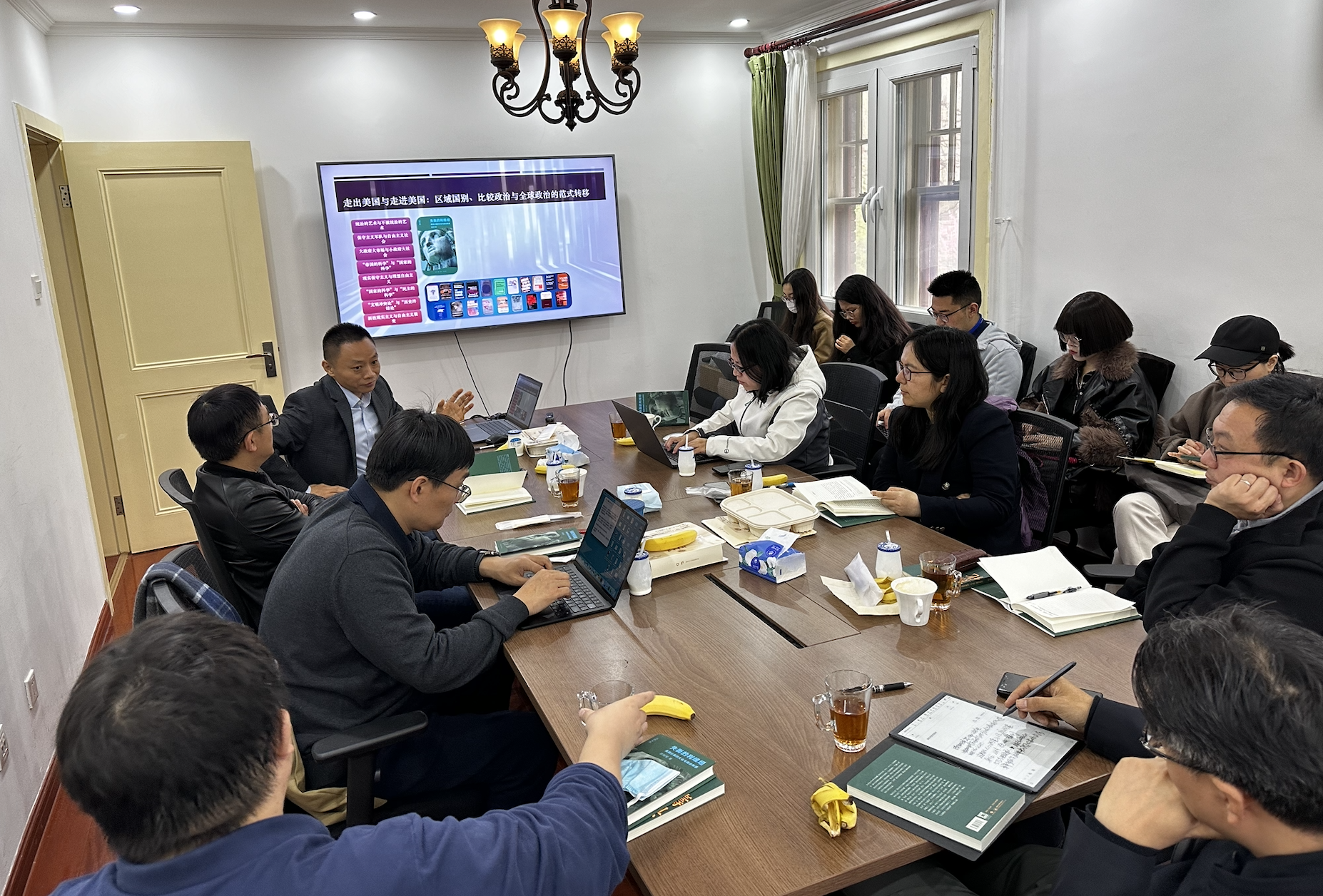
On April 1, the 6th lecture of the Master Salon series hosted by the Institute of Area Studies, Peking University (PKUIAS) was held in No. 66 Yannanyuan Building. With “Why the US has become one of the most unbalanced political bodies in the modern world: The paradigm shift of area studies, comparative politics and global politics” as its theme, Prof. Ou Shujun from the School of International Studies, Renmin University of China, was invited to make the keynote speech. The salon, moderated by Zhang Yongle, deputy director of PKUIAS, saw the participation of Prof. Zan Tao, deputy director of PKUIAS; Prof. Wang Weijia, from PKU’s School of Journalism and Communication; Yang Meng, assistant professor at the School of Foreign Languages, PKU; Sun Hongzhe, assistant professor at PKU’s School of Government; Prof. Song Nianshen, from the Tsinghua Institute for Advanced Study in Humanities and Social Sciences; and Wei Nanzhi, a research fellow at the Institute of American Studies, Chinese Academy of Social Sciences.
Ou Shujun pointed out that the concept of “unbalanced Leviathan” was proposed by Huntington in his 1981 book, American Politics: The Promise of Disharmony. Huntington tried to use belief-based politics to transcend progressivism, consensus and pluralism, in that they all emphasized economic interests at the expense of political ideas; however, per Prof. Ou, belief-based politics only revealed the deep-seated divisions in American society, and the American system is typical of the modern imbalanced system.
Based on his new book Unbalanced Leviathan: The Cultural and Political Roots of the American Divide, Ou Shujun explored the essence of the American social division from eight aspects, starting from the cultural origin of the American social division—the “two Americas.” The eight aspects were: the art of ruling and the art of not being ruled, the conservative military and the liberal society, “big government, big markets” and “small government, big society”, “science of empire” and “science of the state”, realistic conservatism and ideal liberalism, “science of the state” and “science of democracy,” the “clash of civilizations” and “end of history”, and Protestant realism and the liberal split. Prof. Ou Shujun pointed out that after the end of the Cold War and since the September 11 terrorist attack, coupled with the Occupy Wall Street movement and the Trump administration, the great divide between the political ideals of American liberalism and the political reality has increasingly become the central political issue in the US. This divide has also become the root cause of the political conflict in the US, and the US political system of government has thus become the most disharmonious and out-of-balance system in the modern world.
Ou Shujun pointed out that before the rise of area studies, ethnocentrism had long dominated and was the basis of colonialism, imperialism and scientism. Area studies in the US, which started with the Office of Strategic Services, adopted the cultural-regional and frontier anthropology research methods based on Linnaean classification and cultural evolutionary theory. After the end of the Cold War, area studies experienced a transformation from leaving the US and understanding the world to returning to the US and entering the US. Huntington’s last book, Who Are We: The Challenge to America’s National Identity, is a typical representative of the US using cultural difference theory and cultural relativism to study the US itself. He said that the central paradigm of comparative politics is the modernization paradigm, which has three branches: globalization, liberalization and democratization. The foundational paradigms of global politics include liberalism, realism and critical theory.
In the discussion session, the scholars discussed with Prof. Ou Shujun the connection between internal governance and external relations of the US, identity politics, the interaction between demographic change and national identity, the impact of the Israeli-Palestinian conflict on American society and the general election, the political status of the globalized capital, and the present-day explanatory power of Huntington’s analytical framework as well as other issues. The student audience asked questions about the relationship between leadership traits and the US political ecology and the implications of studying Huntington for US studies. Zan Tao, deputy director of the Institute of Area Studies, PKU, pointed out that the characteristic of the knowledge production method of area studies in the US and the West is that the third world provides academic raw materials, which are transported to the first world to produce theoretical knowledge, and then exported to other countries. He opined that China’s area studies should explore and break through the intellectual barriers of this model and build an independent knowledge system. Zhang Yongle, deputy director of the Institute of Area Studies, PKU, summarized the salon, pointing out that considering the US’s shaping of many regional and national orders, studying the shaping power of the US has become an indispensable prerequisite for in-depth study of many shaped regional and national orders. He opined that being self-aware of Chinese subjectivity and being good at using multiple perspectives within the US are extremely important for a comprehensive and in-depth study of the US.


